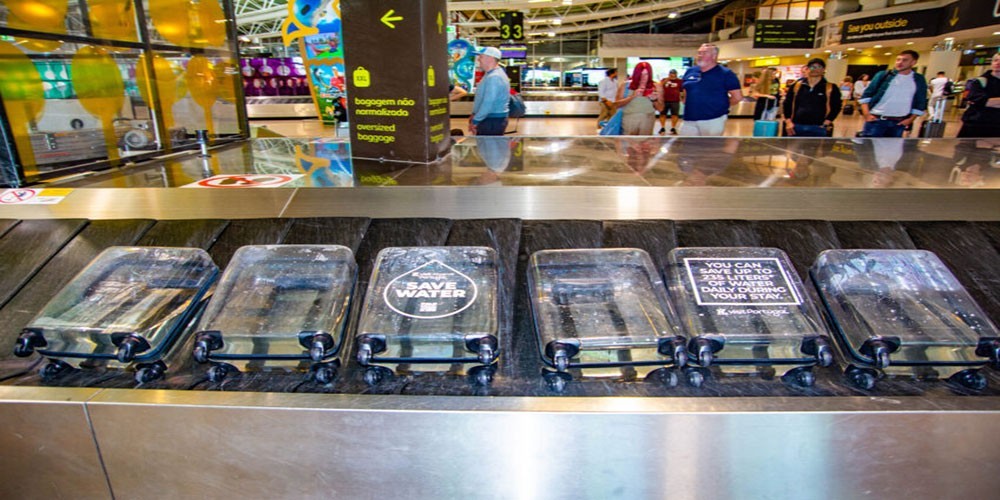
Bags of water on an airport luggage mat alert tourists to "Save Water"
Some got the message straight away, others not so much, but none of the passengers who arrived at Faro Airport today and saw six transparent suitcases full of water circulating on the baggage belt will have been indifferent to this action by the Save Water campaign, which aims to make tourists aware of the need to consume this precious resource more responsibly.
This Tuesday's event, which was attended by Pedro Machado, Secretary of State for Tourism, was a symbolic moment that points to a much wider, multi-platform campaign that will run until the end of the year.
The campaign calling for water saving is based on messages in digital media and in the main tourist markets for the Algarve, but also on billboards and posters in the region, one of which is inside Faro Airport itself, in the arrivals area, a must-see for those who land there.
The Save Water campaign aims to "alert tourists to the importance of adopting good water use practices" and invites them to "enjoy their vacations in a more sustainable way, contributing to the effective protection of resources through a conscious and responsible attitude".
Lídia Monteiro, member of the Board of Directors of Turismo de Portugal, recalled today in Faro that "promoting Portugal as a sustainable destination is fundamental and the Save Water campaign reflects this commitment. Through actions to raise awareness among tourists, such as today's, we are highlighting the importance of environmental concern and involving visitors in protecting our water resources. The goal is to turn every tourist into an active and positive agent in the efficient use of water, contributing to a more sustainable future for all."
For his part, the Secretary of State for Tourism stressed that "the protection of natural resources such as water is a challenge that has to be shared by companies, public bodies and people, residents and tourists. To this end, the government has made water a priority in national sustainability policies, particularly in the Algarve. Tourism is setting an example of mobilization and commitment, with concrete actions to change behaviour and transform the business fabric."
On the sidelines of this event, André Gomes, president of Turismo do Algarve, presented the latest data on the Save Water label, which distinguishes hotel units that implement measures to save water. As of July 18, the level of savings was the same as at the beginning of June: 12% compared to 2023, with some units achieving savings of "more than 30%, without harming the operation".
The latest data also shows a significant increase in the number of adherents to the Commitment to Water Efficiency platform, run by ADENE, Turismo do Algarve's and Turismo de Portugal's partner in this project, which now stands at 110 (85 on May 31, around 13% of the total).
Today, the 110 members represent 16% of the Algarve's total tourist developments - there are around 650 in total - and around 40,000 beds, 31% of the region's total bed supply (previously 20%).
"The water challenge in the Algarve has driven a profound transformation in the tourism sector. Through the Save Water label, we are encouraging the adoption of innovative practices to reduce water consumption and the adherence of our partners demonstrates a strong commitment to sustainability. We believe that by promoting water efficiency and raising awareness of the importance of water, we will build a more sustainable future for the region. Collaboration between everyone is key to overcoming this challenge and positioning the Algarve as a benchmark destination in terms of sustainable tourism," said the president of the Algarve Tourism Board.
Despite the low rate of adherence to the label, both André Gomes and Pedro Machado believe that the results already achieved and the levels of reduction achieved by some units, without compromising their offer (and saving money, of course), could "encourage other resorts to join".
Also present at the session was Chloé Lapeyre, operational director of Ana Aeroportos, who reported on the efforts being made at the Algarve airport itself to reduce consumption, including, but not limited to, reducing flow rates, and on the joint work between ANA and Águas do Algarve to sign a protocol to supply treated wastewater from the existing wastewater treatment plant next to the airport for watering green spaces.
